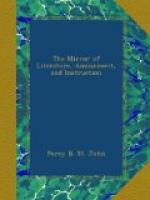* * * * *
CAPTAIN MUNDY’S VISIT TO THE TOMB OF NAPOLEON, AT ST. HELENA.
Having passed two hours on the spot where Napoleon lived and died, we rode onwards to the vale which contains his bones: it is about half a mile from Longwood, and within a few hundred yards of the cottage of Madame Bertrand, to whom he indicated the spot in which he desired to rest, should the English not allow his remains to lie on the banks of the Seine. Soon after leaving Bertrand’s house, we caught sight of the tomb, at the bottom of the ravine called Slane’s valley, and, descending a zig-zag path, we quickly reached the spot. About half an acre round the grave is railed in. At the gate we were received by an old corporal of the St. Helena corps, who has the care of the place. The tomb itself consists of a square stone, about ten feet by seven, surrounded with a plain iron-railing. Four or five weeping-willows, their stems leaning towards the grave, hang their pensile branches over it.
Who could contemplate without interest the little spot of earth which covers all that remains of mortal of the man who made Europe tremble! who carried his victorious arms from the Nile to the Elbe, from Moscow to the Pillars of Hercules; who bore his eagles triumphantly through Vienna, Rome, Berlin, Madrid! Beneath our feet lay he, who “du monde entre ses mains a vu les destinees”—
“The desolator desolate, the victor overthrown!”
“They that see thee,” saith the inspired prophet, “they that see thee shall narrowly look upon thee, and consider thee, saying, Is this the man that made the earth to tremble, and did shake kingdoms; that made the world as a wilderness, and destroyed the cities thereof; that opened not the house of his prisoners? All the kings of the nations, even all of them, lie in glory every one in his own house. Thou shalt not be joined with them in burial, because thou hast destroyed thy land, and slain thy people; the seed of evil-doers shall never be renowned."[5]
[5] Isaiah, xiv. 16, 17, 18, 20.
The willows are decaying fast, and one of them rests upon the sharp spears of the railing, which are buried in its trunk—as though it were comitting suicide for very grief! The foliage of the rest is thinned and disfigured by the frequent and almost excusable depredations of visiters. Fresh cuttings have however, been planted by the Governor, who intends, moreover, to set cypresses round the outer fence. Madame Bertrand’s immortelles have proved, alas! mortal.
The fine, tall, old corporal, who came out from England with the ex-emperor, was full of his praises: “I saw the General often,” said the old fellow; “he had an eye in his head like an eagle!” He described the visit of the French pilgrims to this spot—their Kibla—as most affecting. Some are extravagant beyond measure in their grief, falling on their faces round the railing (which they




